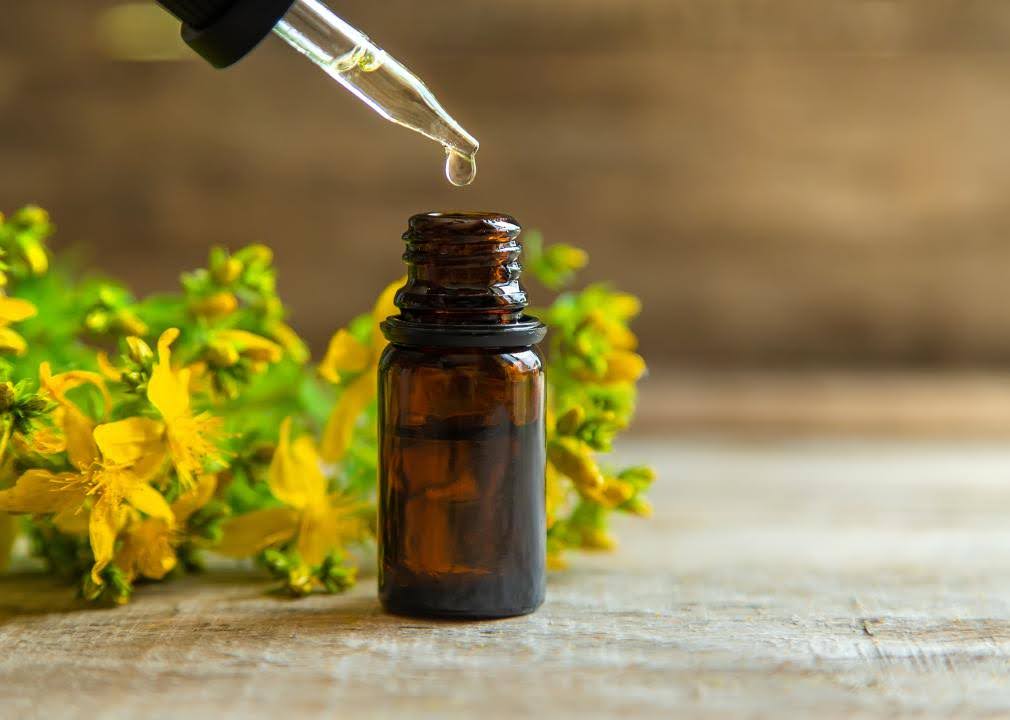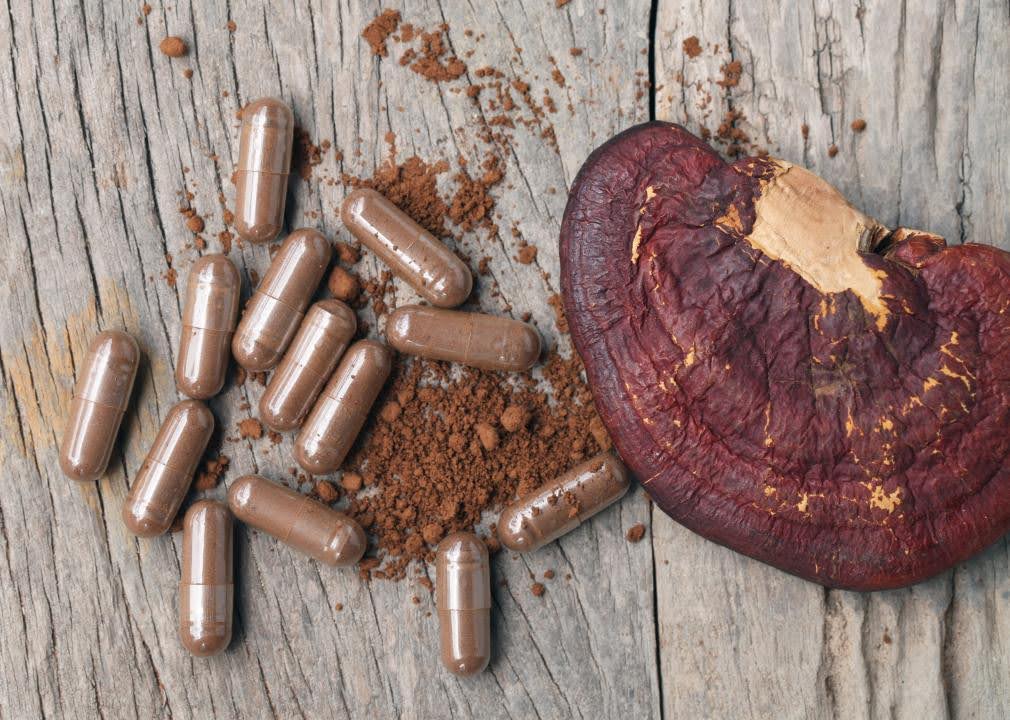Sergii Sobolevskyi // Shutterstock
SUPER GREENS: ALL-NATURAL GREENS POWDER FOR DAILY HEALTH
Elevate your health with 20+ natural superfoods, probiotics, and digestive enzymes to promote digestion, immune support, and balanced energy.
Debunking 5 common supplement myths
About 3 in 4 (74%) American adults take supplements, according to topline data from the 2023 Consumer Survey on Dietary Supplements by Council for Responsible Nutrition. The global nutraceuticals (which offer health benefits beyond nutrition) and supplement market has also grown steadily over the past decade, and this growth increased with the onset of COVID-19 in early 2020, likely as people looked for ways to boost their immune systems.
In 2023, the value of the global dietary supplements market was $188.04 billion and is anticipated to grow 9.10% every year from 2024 to 2032.
Whether you're looking to make up for nutritional holes in your diet, lose weight, bulk up, improve your mental function or sleep, or prevent diseases like cancer or heart disease, there's probably a dietary supplement claiming to be able to help address it, and not too much information on whether it delivers on those claims. Though the Food and Drug Administration regulates supplements, the agency categorizes them under foods, meaning that as long as it doesn't cause harm to consumers, they are able to stay on the shelves, Dr. Pieter Cohen, associate professor at Harvard Medical School and general internist at the Harvard-affiliated Cambridge Health Alliance, told the American Medical Association.
So with all the health claims—and abundance of pseudoscience—out there, what's the nitty-gritty truth about supplements? Is taking vitamins and minerals truly a substitute for a healthy diet? Are dietary supplements really helping people meet their health and beauty goals?
Live It Up consulted various reputable sources like Harvard Men's Health Watch, Johns Hopkins Medicine, Penn Medicine, and more to get the low-down on five common supplement myths. Read on to see which ones shake out and which need a second look.
Editor's note: This article uses published research from medical and scientific journals and other reputable sources but should not be considered medical advice. Please consult your doctor before making any changes to your supplement intake.

shurkin_son // Shutterstock
Everyone needs vitamins
Let's start by debunking one of the most pervasive supplement myths: Everyone needs or benefits from dietary supplements.
The truth is that most people don't actually need to take dietary supplements, according to Cohen. While people with specific medical conditions or nutritional deficiencies may benefit from taking certain vitamin or mineral supplements, eating a healthy, balanced diet will provide all the essential nutrients an average person needs. The big challenge here is whether people can foster good eating habits in the first place.
And no, taking supplements is not a substitute for eating a healthy, balanced diet, according to Jeffrey Millstein, a physician at Penn Internal Medicine Woodbury Heights. To summarize a complex issue, supplements can't replace a healthy diet because they tend to contain only one form of a vitamin or mineral. Supplements also lack complex phytochemicals and other nutrients like fiber in foods that may help your body properly absorb and use vitamins and minerals.
There's still a lot researchers have yet to figure out about the nuances of dietary supplements. However, in a 2022 statement from the United States Preventive Services Task Force, the authors investigating the use of vitamins, minerals, and multivitamins to prevent cardiovascular disease and cancer found that there wasn't enough evidence to prove or disprove this. However, the USPSTF did recommend "against the use of beta carotene or vitamin E supplements" because beta carotene can increase your risk of developing cancer if you smoke or were exposed to asbestos, and vitamin E can increase your risk of hemorrhagic strokes.
So how can you ensure you're getting the right mix and amount of nutrients you need? A good place to start is to ensure you're getting enough of nature's nutrient powerhouses: fruits and veggies. The CDC recommends that adult women consume at least 1.5 cups of fruits and 2.5 cups of veggies daily, while men should consume 2 cups of fruits and 3.5 cups of veggies daily.

Prostock-studio // Shutterstock
Taking B vitamins helps you lose weight
There's a near-endless onslaught of so-called weight loss hacks circling on social media, one of which is that taking B vitamins helps shed pounds. While some elements of potential truth to this myth exist, more research is still needed to establish whether taking B vitamins is linked to losing weight.
Yes, B vitamins absolutely play a very crucial role in metabolism. Most importantly, B vitamins help break down amino acids, release energy from fats and carbohydrates, and transport nutrient-containing energy throughout the body. Some studies also indicate that people of higher weight may have lower levels of B vitamins.
A few rudimentary studies (mostly in lab animals) have also found that vitamin B supplementation may improve the activity of metabolism-related enzymes. Additionally, according to the Cleveland Clinic, if your vitamin B levels are low, getting B12 injections may also help restore your energy levels, making exercising easier. However, it won't directly help you lose weight.
But overall, the idea that popping vitamin B pills will accelerate weight loss is a myth. Some scientifically backed steps that could facilitate weight loss include exercising, eating a healthy diet, and getting enough sleep.

PeopleImages.com - Yuri A // Shutterstock
5 BEST ATHLETIC GREENS ALTERNATIVES
AG1 has gone viral as one of the most recognized greens powders on the market, but how does it stack up against five of the best alternatives? Read here to find out.
All supplements are safe, especially when they're labeled natural
It's pretty easy to see how the myth that all supplements are safe began. For starters, most dietary supplements contain vitamins, minerals, nutrients, or products found naturally in plant and animal sources. Dietary supplements are also sold in pharmacies and are sometimes recommended by doctors.
But it's important to know the FDA does not approve the effectiveness, safety, purity, potency, or labeling claims of dietary supplements (unless they claim to cure, treat, or prevent a disease) before they hit the market. Many manufacturers of dietary supplements don't even need to inform the FDA before they start selling their products to the public. The FDA can take a supplement off the market, but usually only once it's found unsafe or not compliant with the law.
Even products advertised as natural health products or naturally derived don't need to meet any standards to prove that they are natural or safe to consume. You should also remember that just because a supplement is natural doesn't mean it can't cause harm, according to the National Institutes of Health. For example, kava or comfrey supplements can cause liver damage, and taking vitamin K can reduce the effectiveness of blood thinning medications.
So how do you know if a dietary supplement is safe or effective?
Unfortunately, right now, there's no one thing you can do, but a good starting place is to check the product's label for seals from reputable companies such as the National Sanitation Foundation, ConsumerLab.com, United States Pharmacopeia, and Informed Choice. Another option is to research the product online to see if there are published results from independent lab studies or third-party testing that establish the effectiveness or safety of the product.
To learn more about the safety or effectiveness of supplement ingredients, you can also check the NIH's dietary supplement fact sheets.

Tatevosian Yana // Shutterstock
Taking St. John's wort can be used to treat depression
While some supplement myths have a straightforward answer, there is no cut-and-dry answer regarding the safety and efficacy of St. John's wort for depression. St. John's wort has been used as an herbal remedy since ancient times, and its use for the treatment of depression may have begun around or before 1525, which has likely helped perpetuate the idea that it's beneficial for depression.
Some older studies also indicated that taking St. John's supplements may be as effective or more effective than taking a standard antidepressant or placebo for treating mild to moderate forms of depression. Still, the findings of more recent research into the potential benefits of St. John's wort for depression are inconclusive and mixed. More importantly, no study proves that St. John's wort supplementation can help treat severe depression. The NIH also warns that St. John's wort is not a replacement for conventional care for depression, and you should never try to treat depression on your own.
Taking St. John's wort supplements can also cause some pretty nasty side effects, like confusion, increased blood pressure, rapid heartbeat, dizziness, swelling, stomach complaints, fatigue, and sexual dysfunction, according to Cleveland Clinic. It can also negatively interact with a whole slew of medications, including birth control and antidepressant medications.
If you suspect you may be experiencing depression, contact a medical health professional as soon as possible. To learn more about depression and how to treat it, you can check out some resources from the National Institute of Mental Health.

tarapong srichaiyos // Shutterstock
WHY LIVE IT UP SUPER GREENS? REAL MEMBERS - REAL REVIEWS
Thousands have integrated Super Greens into their daily routines, feeling good and uncovering improved health. See what benefits our Supergreens customer base is revealing about these benefits!
Mushrooms, even in supplement form, are beneficial
If you're an avid user of social media like Instagram or Facebook, you're probably aware of the rise in popularity of mushroom supplements. In 2023, the global functional mushroom market size was valued at $31.71 billion, and from 2024 to 2030, it is expected to grow about 11.2% annually.
The list of unverified health benefits associated with mushroom supplements is expansive, ranging from improving memory, focus, and mood to increasing overall health and longevity, as listed by the University of Utah. Mushrooms have also been used medicinally or traditionally by many Indigenous cultures for more than 2,000 years.
So far, the research is clear that mushrooms alone contain numerous compounds that may offer a wide range of health benefits. Mushrooms, when eaten whole, are also an excellent source of prebiotic fiber, which helps support a healthy gut microbiome, and beta-glucans, a kind of soluble fiber that can help control blood sugar levels, according to the University of Utah Health.
As things stand, however, the scientific evidence supporting the health benefits of mushroom supplements is in its early stages. Most mushroom supplement health claims are also based on the assumption that the components of whole mushrooms linked with health benefits remain effective after being processed.
Further research may end up supporting—or debunking—the use of mushroom supplements. For now, if you want to reap the potential benefits of mushrooms, simply try adding more to your diet. Most mushrooms can be added to just about any dish, and if certain varieties are too expensive for your budget, capitalize on common varieties like cremini mushrooms.
Story editing by Carren Jao. Copy editing by Paris Close. Photo selection by Clarese Moller.








Leave a comment